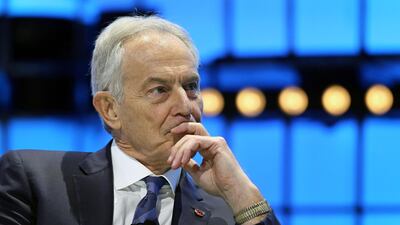Tony Blair has called for a dramatic increase in resources for education that combats extremism in a new report that says learning is an underappreciated tool to deploy against violent ideologies.
In a report titled Teaching tolerance: how to educate against extremism, the Tony Blair Institute for Global Change said it hoped to a launch a charter for education reform that nations could sign up to as part of the UN Global Goals.
The principles in the charter would seek to address the threat from radicalisation in the early years of life, an aspect that security polices had not so far confronted on a world widewide scale. By redressing the imbalance between military and financial responses to extremism, the initiative hopes for an antidote to the spread of hate.
“Ultimately, we can take all the security action we like,” wrote the former British prime minister in a foreword. “But if young people are vulnerable to hateful ideologies, some of them will turn to violence. They do not naturally tend towards such sentiments. It is something that is taught. And it can be untaught.
“A vital component of an enlightened security approach is to treat open-minded education as an imperative. We cannot afford for young children, at the moment of maximum impression in their lives, to be denied an education which will equip them for success in the modern world,” Mr Blair added.
The United Nations Educational, Scientific and Cultural Organisation (UNESCO) has championed an action plan to ensure places of learning do not become a breeding ground for hate.
“The role of education is, therefore, not to intercept violent extremists or identify individuals who may potentially become violent extremists, but to create the conditions that build the defences, within learners, against violent extremism, and strengthen their commitment to non-violence and peace,” wrote Stefania Giannini, the assistant director-general for education. “Teachers are essential to this process.”
The founder of the UAE-based Hedayah organisation that has pioneered programmes on countering violent extremism, Ali Rashid Al Nuaimi also contributed to the report, setting out ideas on the role of the teacher.
"There are a number of different ways the education sector can help to prevent violent extremism among young people,” he wrote. "Teachers can be significant figures in their lives. They can help to shape and mould the attitudes, values and behaviours of their students and play a significant role in building students that are resilient to many negative influences, including violent extremism. Teachers can also identify early warning signs of radicalisation.”
A US expert picked up on the Institute’s ideas about nations taking on responsibility to tackle radicalisation according to the particular threats within their own borders.
“To address female recruitment, for example, the United States might produce effective social-media content aimed specifically at teenage girls targeted by neo-Nazis,” wrote author, Farah Pandith. “Indonesia might scale a one-on-one anti-recruitment initiative using former extremists that it has mastered, while Kenya might further enhance an anti-hate school programme that proved especially effective for seventh graders. Such specialisation would not require governments to relinquish control over their own national anti-extremist programming.
“Combatting extremist ideology has not received the urgency and focused attention that other important issues have. By reimaging what is possible and developing a more sophisticated approach to extremist ideology, nations can curb this global contagion.”
That does not mean that government’s should act insolation to neighbours or other states. “If governments fail to coordinate and scale their anti-extremist initiatives, ‘us versus them’ ideologies will continue to spread, weaponising youth across the world,” she added.
Jimmy Wales, the founder of Wikipedia, co-authored an essay that back the Institute’s call for a global charter.
“Extreme ideologies are difficult to fight against. People and their actions can be restricted, but abstract ideas cannot. The only way to fight them is through education from a young age and through the creation of a productive public dialogue, where radical ideas should be proven harmful and ignorant,” the authors wrote.
Andreas Schleicher, an advisor to the Organisation for Economic Co-operation and Development, aid that educationalists need to standardise means of measure counter-extemism teaching in schools. The Programme for International Student Assessment (PISA) system would publish some results in this area next year.
“For the first time, an international assessment will not just show countries how well their students do in key school subjects, but also whether they can combine knowledge about the world with critical reasoning about global issues,” he wrote. “The willingness and capacity to see the world through different lenses and to appreciate different ways of thinking and different cultures is key in the 21st century, and education can play a central role in fostering this.
“It can help young people analyse global and intercultural issues critically and from multiple perspectives; to understand how differences affect perceptions, judgments and ideas of self and others; and to engage in open, appropriate and effective interactions with others from different backgrounds. In turn, failure to do so can fuel radicalism.”


